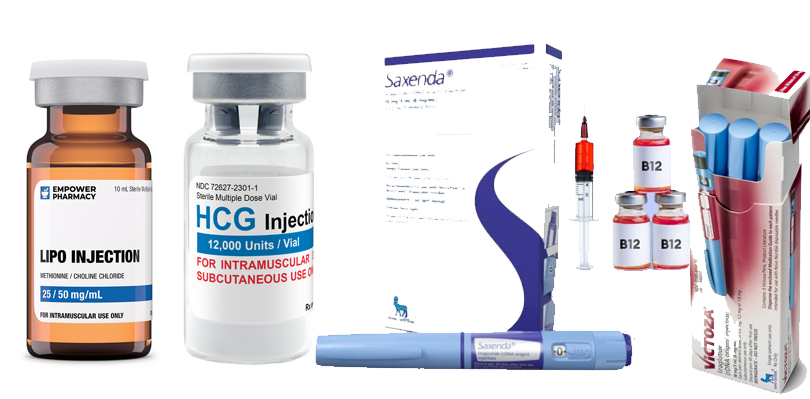Welcome to our comprehensive guide on the transformative world of weight loss injections! In the pursuit of healthier lifestyles, these 5 ultimate weight loss injections have emerged as game-changers. Designed to target stubborn fat and boost metabolism, they offer a promising path for those striving to shed pounds effectively.
But how do these injections really work their magic? From the science behind fat metabolism to the intricacies of appetite control, we’ll delve into each injection’s mechanism to reveal the secrets behind its success. Whether you’re curious about Lipotropic injections, hCG shots, or others, join us as we unravel the science, benefits, and considerations of these injections, empowering you on your journey to a slimmer, healthier you.
What Are Weight Loss Injections
Weight loss injections are medical treatments designed to aid individuals in their journey to achieve weight loss goals. These injections contain specific compounds, vitamins, hormones, or medications that target various aspects of weight management, such as fat metabolism, appetite suppression, and energy expenditure.
Meanwhile, by delivering these substances directly into the body through injections, weight loss injections aim to enhance the body’s natural processes, making it more efficient at burning fat, curbing cravings, and promoting overall weight loss. These injections are often used in conjunction with a healthy diet and exercise regimen, offering a potential solution for individuals struggling to lose weight through conventional methods alone.
Top Weight Loss Injections

Here are the top trending weight loss injections that can help you lose weight:
Lipotropic Injections
Lipotropic injections contain a combination of amino acids, vitamins (like B12), and other nutrients that aid in the breakdown and metabolism of fat in the liver. These injections enhance the liver’s ability to process and eliminate fat, preventing the buildup of fatty deposits. Methionine, inositol, and choline are key components that assist in lipid metabolism and energy production. By promoting efficient fat metabolism, lipotropic injections can help in weight loss and improve energy levels.
HCG Injections (Human Chorionic Gonadotropin)
HCG injections are based on the hormone produced during pregnancy. They work by suppressing appetite and targeting stored fat for energy. hCG helps maintain muscle mass while promoting fat loss, making it an attractive option for those seeking rapid weight reduction. This hormone also triggers the release of abnormal fat stores, aiding in localized fat reduction. When combined with a very low-calorie diet, hCG injections can result in significant weight loss.
Saxenda (Liraglutide) Injections
Saxenda is an FDA-approved injection that contains liraglutide, a GLP-1 receptor agonist. It functions by regulating appetite control centers in the brain, leading to reduced food intake. Additionally, it slows down stomach emptying, promoting a feeling of fullness. Saxenda also influences insulin sensitivity and promotes weight loss by utilizing stored fat for energy. It is typically prescribed for individuals with obesity and those struggling with weight-related health issues.
B12 Injections
Vitamin B12 injections are often used as part of a weight loss program due to their role in energy production and metabolism regulation. B12 aids in the breakdown of fatty acids and proteins, which support the body’s energy production. By boosting metabolism, B12 injections can increase overall energy levels, potentially encouraging increased physical activity and calorie expenditure.
Victoza (Liraglutide) Injections
Similar to Saxenda, Victoza contains liraglutide and is primarily used to treat type 2 diabetes. It also aids in weight loss by affecting appetite and digestion. Victoza stimulates insulin secretion, reduces glucagon production, and slows down stomach emptying. These actions collectively result in reduced food intake and lower post-meal blood sugar levels. As a side effect, weight loss occurs, making Victoza a beneficial option for those looking to manage diabetes and lose weight simultaneously.
It’s important to note that these injections should be administered under the guidance of a medical professional and as part of a comprehensive weight loss plan. Each individual’s response to these injections may vary, and they are usually most effective when combined with a balanced diet and regular exercise routine. Always consult a healthcare provider before starting any weight loss injection regimen.
Effects Of Weight Loss Injections
Weight loss injections can have various effects on both mental and physical health. Here are some effects of these injections on your well-being:
Improved Self-Esteem And Confidence
Successful weight loss achieved through these injections can lead to a significant boost in self-esteem and confidence. As individuals see visible changes in their bodies, they often experience a more positive self-image, which can have a profound impact on their mental health and overall outlook on life.
Enhanced Mood And Mental Well-Being
Weight loss injections can positively affect mood by promoting the release of endorphins and neurotransmitters that contribute to feelings of happiness and well-being. The achievement of weight loss goals can reduce stress and anxiety, leading to an improved mental state and a more positive attitude.
Increased Motivation And Focus
Experiencing successful weight loss through these inoculations can enhance motivation and focus. Achieving milestones and witnessing progress can inspire individuals to stay committed to their weight loss journey, both physically and mentally. This newfound motivation can extend to other areas of life as well.
Better Physical Mobility And Vitality
Weight loss injections that lead to significant weight reduction can greatly improve physical mobility. With reduced body weight, joints experience less stress, making movement easier and more comfortable. This increased mobility can enhance overall vitality and the ability to engage in physical activities.
Potential Health Benefits
Beyond weight loss, these inoculations may lead to improved physical health markers. For instance, reduced body weight can lower the risk of obesity-related health issues such as diabetes, cardiovascular diseases, and joint problems. The potential for better health outcomes contributes to a sense of well-being and security.
Challenges In Adherence And Body Image Perception
While weight loss injections can yield positive effects, challenges in adhering to the injection schedule and maintaining weight loss can sometimes lead to frustration and negative self-perception. Additionally, achieving weight loss goals may not necessarily resolve all body image concerns, potentially impacting mental health.
It’s important to approach weight loss inoculations as part of a holistic strategy that encompasses both physical and mental well-being. Consulting with a medical professional before starting any injection regimen is crucial to ensure that the chosen approach aligns with individual health needs and goals. Additionally, combining these injections with healthy lifestyle choices, such as balanced nutrition and regular exercise, can optimize the benefits for both mental and physical health.
Side Effects Of Weight Loss Injections
While weight loss injections can offer potential benefits, they also come with potential side effects that can affect both the mind and body. Here are some detailed side effects to be aware of:
Mood Fluctuations And Emotional Responses
Weight loss injections can impact mood due to hormonal changes, potential nutrient imbalances, or the stress of undergoing a weight loss program. Some individuals may experience mood swings, irritability, or even symptoms of depression and anxiety. Hormonal fluctuations can play a role in these mood changes, affecting neurotransmitter levels that influence emotions.
Gastrointestinal Distress
Many weight loss inoculations can cause gastrointestinal discomfort, including nausea, vomiting, diarrhea, or constipation. These symptoms can be attributed to the body adjusting to the injected substances, changes in metabolism, or alterations in digestion. Gastrointestinal issues can not only be physically uncomfortable but also affect one’s mental well-being.
Potential Nutrient Deficiencies
Weight loss injections that involve severe calorie restriction or alteration of nutrient absorption can lead to nutrient deficiencies. For instance, injections that curb appetite might result in reduced food intake, potentially leading to insufficient intake of essential vitamins and minerals. Nutrient deficiencies can negatively impact physical health and, consequently, mental well-being.
Body Image And Identity Challenges
Achieving weight loss through inoculations can sometimes trigger complex feelings related to body image and identity. While physical changes may occur, mental adjustments might take longer. Rapid weight loss can lead to feelings of disconnection from one’s own body or uncertainty about a changing identity, potentially affecting self-esteem and body image perception.
Metabolic Changes And Energy Levels
Weight loss injections can influence metabolism and energy levels. While weight loss is a goal, rapid metabolic changes can sometimes lead to fatigue, dizziness, or even fainting spells. These physical sensations can trigger emotional responses such as frustration or anxiety, particularly if they interfere with daily activities or exercise routines.
It’s essential to approach weight loss inoculation with caution and under the guidance of a healthcare professional. Understanding the potential side effects and monitoring your mind and body’s responses is crucial. Regular communication with a medical provider can help address any concerns and make necessary adjustments to the injection regimen. Additionally, focusing on a holistic approach that includes psychological well-being, balanced nutrition, exercise, and mental health support can mitigate potential side effects and promote a more positive weight loss experience.
Experts Opinion About Weight Loss Injections
Expert opinions on weight loss shots are diverse. While some medical professionals acknowledge their potential benefits for jumpstarting weight loss, many emphasize caution. Doctors often stress that injections should be part of a comprehensive plan, including diet, exercise, and lifestyle changes. They caution against relying solely on injections and highlight potential risks, like side effects and inadequate long-term results.
Furthermore, medical experts also stress the importance of individualized treatment, with injections tailored to each patient’s needs. Overall, doctors recommend discussing options with a qualified healthcare provider, as injection might not be suitable for everyone and require careful monitoring to ensure both safety and sustainable results.
FAQs
How do weight loss injections work, and are they effective?
Weight loss injections work through various mechanisms depending on the type. Lipotropic injections contain amino acids and vitamins that aid in fat metabolism, while hCG injections suppress appetite and target stored fat. Injections like Saxenda and Victoza regulate appetite control centers, while B12 injections boost metabolism. Effectiveness varies among individuals; while injection can aid weight loss, they’re most successful when combined with a balanced diet and exercise.
What are the potential side effects of weight loss injections?
Side effects vary with each injection. Lipotropic injections might cause gastrointestinal discomfort, while hCG injections can lead to mood swings. Saxenda and Victoza injections may induce nausea, and B12 injections might result in an energy boost followed by a crash. It’s essential to consult a healthcare professional before starting any regimen and be aware of potential side effects, which can include mood changes, gastrointestinal issues, and metabolic adjustments.
Are weight loss injections a long-term solution, and who should consider them?
These injections are not a standalone solution and should be part of a comprehensive plan. They can provide a jumpstart to weight loss but are most effective when combined with sustainable lifestyle changes. Individuals struggling with obesity or weight-related health issues might consider them, but personalized medical advice is crucial. Consulting a healthcare provider is essential to determine if weight loss injections are suitable, safe, and appropriate for long-term use based on individual health needs and goals.

